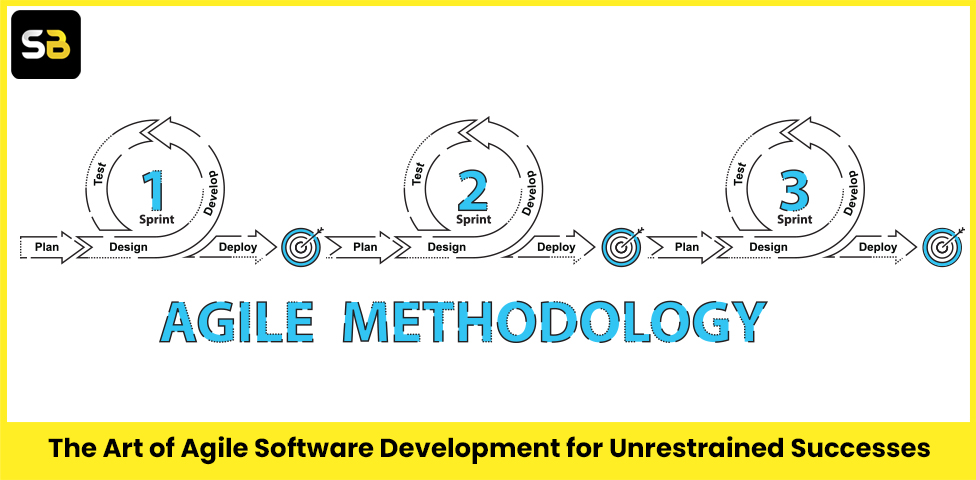
- Mar 22, 2022
The Art of Agile Software Development for Unrestrained Successes
The Agile software development methodology and approach is all about adaptability, team collaboration, incremental delivery, and continual learning and planning, to keep up with the rapid change in the paradigm of technology, which is portrayed as a notable shift in project management method – contrary to the traditional Waterfall model which was much more popular in the past. In other words, the Agile methodology is one of the easiest and most uncomplicated routes to transform an idea and its varied needs into feasible software solutions.
What is Agile Software Development?
 Agile software development which is even used by us as a mobile application development company in Kolkata is a set of methods that results in frequent and fast delivery of value to the customers.
Agile promotes well-planned, minor iterations by highly collaborative, cross-functional teams.
In other words, Agile methodology delivers an alternative to the long-practiced sequential development process and long release cycles traditionally associated with Waterfall.
Therefore, Agile is a good fit for any business size (right from start-up ventures to large enterprises), any team size, and most projects.
However, any organization adopting Agile methodology must remain culturally ready for change and stay committed to coaching and training.
Agile software development which is even used by us as a mobile application development company in Kolkata is a set of methods that results in frequent and fast delivery of value to the customers.
Agile promotes well-planned, minor iterations by highly collaborative, cross-functional teams.
In other words, Agile methodology delivers an alternative to the long-practiced sequential development process and long release cycles traditionally associated with Waterfall.
Therefore, Agile is a good fit for any business size (right from start-up ventures to large enterprises), any team size, and most projects.
However, any organization adopting Agile methodology must remain culturally ready for change and stay committed to coaching and training.
Seven Key Benefits of Using Agile Methodology for Software Development
1. Engaging Stakeholders
 Agile is a methodology that helps to create robust opportunities for engaging team members and stakeholders through every Sprint which enhances the degree of collaboration between the client and the project team.
Hence when the software is delivered fast and efficiently, it boosts the stakeholder’s trust in the IT team’s ability to deliver high-quality software.
Agile is a methodology that helps to create robust opportunities for engaging team members and stakeholders through every Sprint which enhances the degree of collaboration between the client and the project team.
Hence when the software is delivered fast and efficiently, it boosts the stakeholder’s trust in the IT team’s ability to deliver high-quality software.
2. Increase Client Engagement
 When an organization implements an Agile software development methodology to develop business software solutions, the client can remain completely involved throughout the entire development process. Right from prioritizing the features that are needed to be integrated to tracking review sessions and software builds.
3. On-Time Delivery
When an organization implements an Agile software development methodology to develop business software solutions, the client can remain completely involved throughout the entire development process. Right from prioritizing the features that are needed to be integrated to tracking review sessions and software builds.
3. On-Time Delivery
 Since this methodology when used in software development uses timeboxed and fixed schedule Sprints that can last anywhere between one and four weeks, IT companies can deliver their deliverables faster, make frequent iterations, ensuring high levels of predictability.
Therefore, using Agile methodology businesses and developers get the opportunity to beta test or test release the software even at a nascent stage of development.
Since this methodology when used in software development uses timeboxed and fixed schedule Sprints that can last anywhere between one and four weeks, IT companies can deliver their deliverables faster, make frequent iterations, ensuring high levels of predictability.
Therefore, using Agile methodology businesses and developers get the opportunity to beta test or test release the software even at a nascent stage of development.
4. Accurate Schedule and Estimated Costs
 Since in Agile development, each Sprint is stretched over a pre-decided duration, the cost factor can be easily predicted, as to the amount of work that the developers can perform within the fixed-schedule time box.
This helps to provide a realistic cost and time estimate to the client prior to each Sprint, whereby the stakeholders can comfortably find an estimate of the approximate cost of each feature, which in turn enables powerful decision-making related to the priority of features and the requirements for add-on iterations.
Since in Agile development, each Sprint is stretched over a pre-decided duration, the cost factor can be easily predicted, as to the amount of work that the developers can perform within the fixed-schedule time box.
This helps to provide a realistic cost and time estimate to the client prior to each Sprint, whereby the stakeholders can comfortably find an estimate of the approximate cost of each feature, which in turn enables powerful decision-making related to the priority of features and the requirements for add-on iterations.
5. Easier Scope for Change
 Using the Agile software development approach, the team stays focused on integrating the features of the product agreed by the stakeholders and the client after every iteration.
Using the Agile software development approach, the team stays focused on integrating the features of the product agreed by the stakeholders and the client after every iteration.
6. User-Focused Process
In Agile software development, the team commonly makes use of “user stories” and regular feedback to define the product features which are backed by the requirements of the real users of the solution. Additionally, the Agile methodology permits beta testing of the software after every Sprint whereby developers find useful feedback even during the early stages of the development process.7. Better Quality
 The Agile software development methodology breaks down the development process of the project into manageable units, which enables the teams to remain focused on high-quality development, testing, and collaboration.
This process incorporates frequent builds and frequent testing along with incessant quality checks so that the developers can constantly refine the product by introducing new changes within a very short time.
The Agile software development methodology breaks down the development process of the project into manageable units, which enables the teams to remain focused on high-quality development, testing, and collaboration.
This process incorporates frequent builds and frequent testing along with incessant quality checks so that the developers can constantly refine the product by introducing new changes within a very short time.
Why Agile Is Better Than Waterfall?
While the erstwhile popular Waterfall methodology consists of adhering to a strict sequential order for the developing team to proceed to the next phase of development or testing (only when they have completed the previous stage successfully), the Agile methodology of software development encourages continuous iterations of development and testing in the course of the development process. Therefore, in layman’s language, while Agile software development is preferred for its incremental approach and flexibility, the Waterfall methodology follows a linear sequential design process which is not so popular in the present times for its strict structures.What Is the Agile Software Development Life Cycle?
 The main objective of Agile software development is to adapt to frequent changes and ultimately deliver full-functional software solutions within the least possible time. For this the Agile software development process is divided into six phases which are as follows:
The main objective of Agile software development is to adapt to frequent changes and ultimately deliver full-functional software solutions within the least possible time. For this the Agile software development process is divided into six phases which are as follows:
- Concept phase
- Inception phase
- Construction phase
- Release phase
- Production phase
- Retirement phase
- Kanban
- Scrum
- Scrumban
- Crystal
- Agile Modeling
- Extreme Programming (XP)
- Feature Driven Development (FDD)
- Lean Software Development
- Scaled Agile Framework (SAFe)
- Disciplined Agile Delivery (DAD)
- Dynamic Systems Development Method (DSDM)
Take Away - Necessity Is the Mother of Invention
The Agile methodology has evolved over time as development teams work to improve processes and build on the philosophies stated in the Agile Manifesto, a set of 12 principles laid out by the Agile Alliance to help teams grow with the Agile movement that includes: Principle #01 “Our highest priority is to satisfy the customer through early and continuous delivery of valuable software.” Principle #02 “Welcome changing requirements, even late in development. Agile processes harness change for the customer’s competitive advantage.” Principle #03 “Deliver working software frequently, from a couple of weeks to a couple of months, with a preference to the shorter timescale.” Principle #04 “Business people and developers must work together daily throughout the project.” Principle #05 “Build projects around motivated individuals. Give them the environment and support they need, and trust them to get the job done.” Principle #06 “The most efficient and effective method of information to and within a development is face-to-face conversation.” Principle #07 “Working software is the primary measure of progress.” Principle #08 “Agile processes promote sustainable development. The sponsors, developers, and users should be able to maintain a constant pace indefinitely.” Principle #09 “Continuous attention to technical excellence and good design enhances agility.” Principle #10 “Simplicity - the art of maximizing the amount of work not done - is essential.” Principle #11 “The best architectures, requirements, and designs emerge from self-organizing teams.” Principle #12 “At regular intervals, the team reflects on how to become more effective, then tunes and adjusts its behavior accordingly.” Now that you know what is Agile Software Development if you want a mobile app development company in Kolkata that incorporates processes - large and small and is optimized for people; we have teams that are empowered to perform at their best and deliver quality results at a sustainable pace for empowering rapid business growth.Our Office

USA
Seattle
2515 4th Avenue, Centennial Tower Seattle 98121
United States Of America
+1-7543-335-140

Australia
Sydney
Rubix Alliance Pty Ltd Suite 305/30 Kingsway, Cronulla NSW 2230
+6-1480-023-313

India
Kolkata
Adventz Infinity, Office No - 1509 BN - 5, Street Number -18 Bidhannagar, Kolkata - 700091 West Bengal
+91-8240-823-048
India
Bengaluru
KEONICS, #29/A (E), 27th Main, 7th Cross Rd, 1st Sector, HSR Layout, Bengaluru, Karnataka 560102
+91-9804-360-617
Unleash the Sales Beast Within and Watch Your Revenue Soar!
GET A FREE ANALYSIS OF YOUR WEBSITE NOW!








